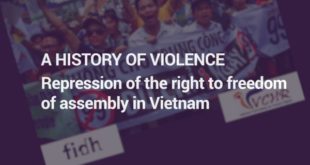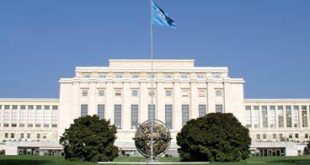His Royal Majesty King Bhumibol Adulyadej
Kingdom of Thailand
Transmitted by the good offices of H.E. Thana Duangratana,
Ambassador of Thailand in Paris
Your Majesty,
On the day you were hospitalized for a grave operation in July 2006, I was in Bangkok on a stop-over to an international conference. I will never forget how the streets of Bangkok turned to gold with the flow of people clad in yellow shirts inscribed “Long Live the King”. I saw pictures of the anxious crowds waiting outside the hospital just to catch a glimpse of their beloved King. But most moving of all was a photo of you, Your Majesty, standing on the hospital’s balcony just before your operation. You looked tired and frail from your illness, but you were holding a camera, and diligently taking photos of the people who had come to pray for your speedy recovery. For me, this single picture captured all the compassion and humanity which has made you so beloved of your people and internationally respected. It was the picture of a kind and caring monarch who puts his people before himself, who forgets his own pain before his people’s emotions and concerns.
Today, I am writing to respectfully request Your Majesty to extend your compassion and humanity to Ly Tong, a Vietnamese dissident detained in Thailand who risks expulsion to Vietnam. In November 2000, Ly Tong, 58, a Vietnamese-born US citizen, rented a private plane from the Huat Hin beach resort in southern Thailand and, without permission, flew to Ho Chi Minh City, where he dropped 50,000 leaflets calling for democracy in Vietnam. He was arrested on his return to Thailand and sentenced to seven years in prison for violating Thai airspace. He served almost six years of the sentence, and was granted early release in May 2006. However, the Vietnamese government requested that he be extradited and stand trial in Vietnam, and he was again detained pending the extradition trial. Last week, on 7th September 2006, the Thai Criminal Court ordered Ly Tong’s extradition to Vietnam. He has 15 days to file an appeal.
Under Thailand’s 1929 Extradition Law, defendants cannot be extradited for committing political crimes. The Vietnamese government wrote to the Thai Criminal Court promising not to judge Ly Tong for political crimes, and the Thai Judge Peeravut Ang-chuan ruled Ly Tong’s extradition on the grounds that he would not face political charges in Vietnam. However, immediately after the verdict was pronounced, Hanoi Foreign Ministry spokesman Le Dung announced that Ly Tong had committed “dire violations of national sovereignty and national security” and would be “severely punished”. Under Vietnam’s Criminal Code, breaching “national security” is a highly political crime. The vaguely-worded, broadly defined “national security” offences carry extremely heavy penalties. Ly Tong risks life imprisonment if he returns to Vietnam.
As President of the Paris-based Vietnam Committee on Human Rights, and Vice-President of the International Federation on Human Rights (FIDH) I am deeply concerned that Ly Tong will be denied the right to a fair trial. In Vietnam’s one-Party state, the legislative, executive and judiciary are all controlled by the Communist Party of Vietnam. Trials are held behind closed doors, and defendants are routinely denied access to defense counsel of their choice. It is impossible to provide an international defense lawyer for Ly Tong under Vietnamese law, as Decree 87/2003/ND-CP prohibits foreign lawyers, and even Vietnamese lawyers employed by foreign firms, from participating in Vietnamese courts. Moreover, given the Foreign Ministry’s recent declarations, Ly Tong’s basic right to presumption of innocence will clearly not be upheld.
Vietnam claims that Ly Tong is a “dangerous terrorist”, but in fact he has never used violence or endangered anyone’s safety or life. His true “crime” is his insatiable craving for freedom in Vietnam. An air marshal in the former South Vietnamese military, Ly Tong was detained without trial for 5 years in re-education camp under inhumane conditions, forced to perform hard labour and living on starvation rations. In 1980, He escaped from A20 Camp (Phu Yen) and gained freedom by walking, cycling, hitch-hiking for over 2,500 miles through the jungles of Cambodia and Thailand, finally swimming at night across the Strait of Johore from Malaysia to Singapore, where he requested political asylum at the US Embassy. Arriving in the United States as a refugee, he continued to denounce the lack of democracy in Vietnam, launching a series of one-man protests. In 1992, he hijacked a Vietnam Airlines flight and dropped pro-democracy leaflets over Ho Chi Minh City before parachuting into the town. He was immediately arrested and sentenced to 20 years in prison. He was detained for six years, and released from Ba Sao Camp (northern Vietnam) in a government amnesty in 1998 .”
Ly Tong has always acted alone, waging a one-man battle against Communist rule. His actions are invariably spectacular and extravagant – sometimes unlawful, as in the case of his violating airspace to drop democracy leaflets over Vietnam. But they are by no means violent. They are simply Ly Tong’s way of drawing world attention to Vietnam’s abysmal human rights situation, so often neglected by international opinion and the media. As a former pilot, flying planes was what he knew best, and he used this knowledge to highlight his people’s plight.
Ly Tong has paid a heavy price for his actions and beliefs. If he is sent back to Vietnam, he will suffer the vengeance and oppression of a regime that tolerates no diversity or difference of opinion. This is the last opportunity to save him. I appeal to you, Your Majesty, to urgently intervene on behalf of Ly Tong and demand the Thai Criminal Court to lift the extradition order immediately. I place my trust in your humanity and compassion, and in the justice of your kingdom, to ensure that Ly Tong will not be unjustly sent back to Vietnam to spend the rest of his life in the hell of a Vietnamese jail.
I have the honour to remain, Sir, Your Majesty’s obedient servant.
Vo Van Ai
President,
Vietnam Committee on Human Rights
Vice-President
International Federation on Human Rights (FIDH)
 Quê Me Quê Me: Action for democracy in Vietnam & Vietnam Committee on Human Rights
Quê Me Quê Me: Action for democracy in Vietnam & Vietnam Committee on Human Rights


